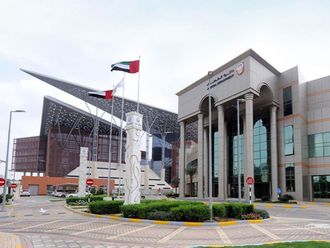Sharjah: The mystery behind the rampant disappearance of cables and batteries from telecommunication towers in the Central Region in Sharjah was solved by Sharjah Police on Saturday with the arrest of a member of a technical team attached to one of the UAE’s telecommunication service providers.
The suspects stole cables and batteries from more than 30 telecommunication towers impacting the functioning of the cellular network and telecommunications services in many areas of the Central Region.
Major Abdullah Maleeh, Head of the Criminal Investigation Department in the Central Region, said the Sharjah Police Central Region received numerous complaints from telecommunication authorities regarding thefts of cables and batteries from telecommunication masts that boost signal strength.
Police formed a team to investigate the incidents and arrested some suspects. Further investigations revealed that the stolen cables and batteries had been displayed for sale in a scrap shop in Al Dhaid.
After the completion of legal proceedings, police raided the shop and found dozens of the stolen batteries put up for sale.
The owner of the shop told police that the batteries had been stocked by a person he believed to be a Bangladeshi national who, he said, had rented part of the shop along with his Pakistani partner.
Further investigations revealed that the suspect was not Bangladeshi but a Pakistani national who was an illegal resident and had violated UAE residency law.
Police arrested all those involved in the racket including the owner of the scrap shop as well the man who had been selling the stolen batteries.
The suspects told police that they had been assisted in their dealings by a computer operator and a network technician, who was believed to be working for a telecommunications subcontracting company and was involved in field work. The duo were found to have passed on information about locations of telecommunications stations and they also had keys to access the stations.
The suspects, all of whom were Pakistanis, confessed to their crime and the case was referred to public prosecution.












